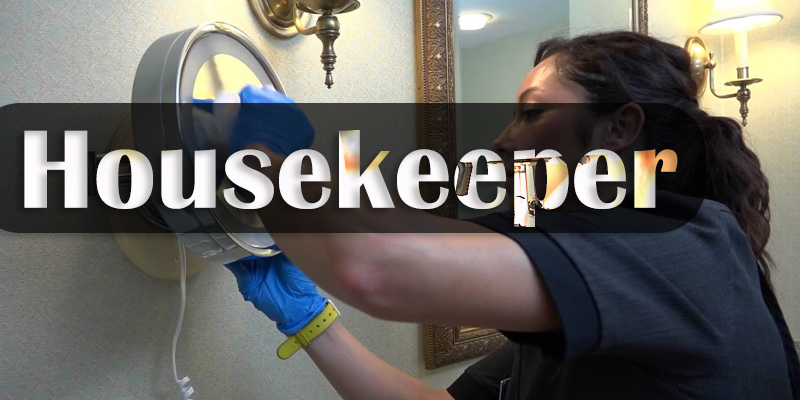
The syllabus for the ITI Trade "Corporate House Keeping" in English. This one-year course, offered under the Craftsman Training Scheme (CTS) by the National Council for Vocational Training (NCVT), trains students in maintaining cleanliness, hygiene, and order in corporate environments such as offices, commercial buildings, and industrial facilities. The syllabus includes Trade Theory, Trade Practical, Workshop Calculation and Science, Engineering Drawing, and Employability Skills. Here’s the detailed breakdown:
1. Trade Theory
This section provides theoretical knowledge about housekeeping practices tailored to corporate settings.
- Introduction to Corporate House Keeping
- Definition and importance of housekeeping in corporate environments.
- Role of a Corporate House Keeper in maintaining workplace standards.
- Overview of job opportunities in offices, malls, factories, and corporate campuses.
- Hygiene and Sanitation
- Principles of personal hygiene and professional grooming.
- Cleaning standards for corporate spaces: offices, conference rooms, restrooms.
- Use of disinfectants and sanitizers to maintain a healthy environment.
- Cleaning Tools and Equipment
- Types of tools: brooms, mops, dusters, and their specific uses.
- Equipment: vacuum cleaners, floor polishers, scrubbers—functions and operation.
- Safe handling and storage of cleaning chemicals.
- Corporate Environment Maintenance
- Cleaning procedures for workstations, meeting rooms, and common areas.
- Waste management: segregation, disposal, and recycling practices.
- Maintenance of floors (e.g., marble, tiles, carpets) and furniture.
- Safety Practices
- Workplace safety: use of personal protective equipment (PPE) like gloves and masks.
- Fire safety: understanding extinguishers and evacuation protocols.
- Accident prevention: handling spills, electrical hazards, and slippery surfaces.
- Office Etiquette and Coordination
- Interaction with office staff and management.
- Coordination with facility management and other departments.
- Time management for scheduled cleaning tasks.
- Quality Standards
- Corporate cleanliness benchmarks: dust-free surfaces, odor control, and neatness.
- Inspection techniques to ensure high standards.
- Addressing substandard conditions promptly.
- Environmental Awareness
- Eco-friendly cleaning practices: use of green products.
- Energy and water conservation in housekeeping tasks.
- Basic Entrepreneurship
- Opportunities in contract-based housekeeping services.
- Cost estimation for supplies and labor in corporate settings.
2. Trade Practical
This hands-on component develops practical skills in corporate housekeeping tasks.
- Hygiene and Grooming
- Demonstrate personal hygiene: uniform maintenance and hand washing.
- Practice sanitizing tools and workstations before and after use.
- Equipment Operation
- Use cleaning tools: sweep, mop, and dust various surfaces.
- Operate equipment: vacuum carpets, polish floors, and scrub tiles.
- Perform basic maintenance: clean filters, refill solutions, and store equipment.
- Cleaning Procedures
- Clean office spaces: desks, chairs, windows, and partitions.
- Maintain restrooms: sanitize toilets, sinks, and replenish supplies (e.g., soap, paper).
- Polish furniture and fixtures to a professional standard.
- Waste Management
- Segregate waste: recyclable, non-recyclable, and hazardous materials.
- Empty and clean trash bins, ensuring proper disposal.
- Safety Practices
- Use PPE correctly during cleaning tasks.
- Conduct fire safety drills: operate extinguishers and follow evacuation routes.
- Handle spills and hazards: clean and mark wet floors to prevent slips.
- Workplace Coordination
- Simulate interaction with office staff for cleaning schedules.
- Practice reporting maintenance issues (e.g., broken fixtures) to supervisors.
- Project Work
- Execute a full cleaning cycle for a mock corporate office setup.
- Present a cleaned area meeting corporate quality standards.
3. Workshop Calculation and Science
This covers mathematical and scientific principles relevant to housekeeping.
- Calculations
- Measure cleaning areas and calculate supply needs (e.g., detergent quantities).
- Estimate time and cost for housekeeping tasks.
- Science
- Properties of cleaning agents: pH levels, disinfecting capabilities.
- Basics of stain removal and surface care (e.g., wood, glass).
4. Engineering Drawing
This focuses on basic drawing skills for layout planning.
- Drawing Basics
- Sketch simple office layouts and cleaning zones.
- Draw equipment placement and waste disposal areas.
5. Employability Skills
This enhances professional skills for job readiness.
- Communication
- Practice verbal and written communication with staff and supervisors.
- Workplace Skills
- Time management, teamwork, and problem-solving in a corporate setting.
Course Overview
- Duration: 1 year (2 semesters of 6 months each)
- Eligibility: Passed 10th class examination from a recognized board.
- Objective: To train individuals in maintaining cleanliness and hygiene in corporate environments, preparing them for roles like Corporate Housekeeper, Office Cleaner, or Facility Assistant in offices, commercial complexes, or industrial units.
This syllabus aligns with the NCVT framework for "Corporate House Keeping" and may vary slightly by state or ITI. For the most current version, refer to the Directorate General of Training (DGT) website or local ITI resources. The course emphasizes practical training to meet the demands of modern corporate workplaces.
Trade Type
- 10 views